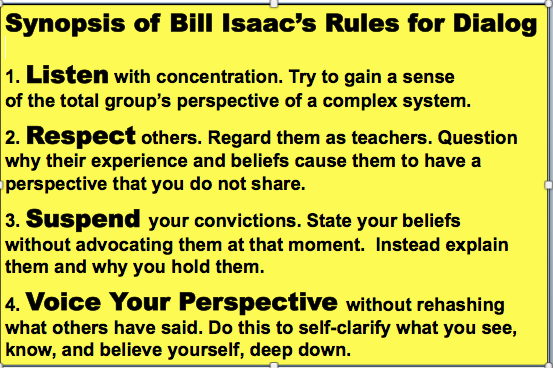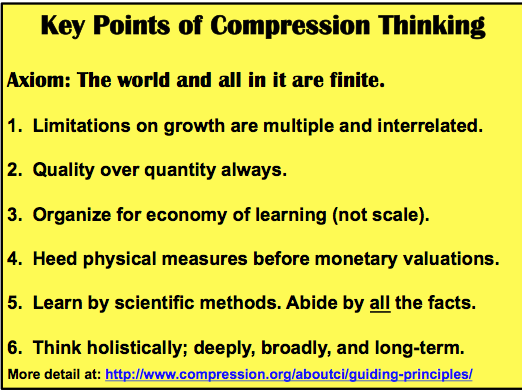 We really do have to cut back our overall use of resources – transform from resource intensive “cowboy” economics into an economy of wiser competence. From what we have seen, that is unlikely through government policy or by entrepreneurs inventing independent partial solutions, although those can contribute greatly to improving systems vital to our well being. However, each innovation must fit a systemic need by helping us improve the economic-natural systems on which our local areas and regions depend. The global environment is a connected patchwork of all these areas, so we should not improve some while wrecking others.
We really do have to cut back our overall use of resources – transform from resource intensive “cowboy” economics into an economy of wiser competence. From what we have seen, that is unlikely through government policy or by entrepreneurs inventing independent partial solutions, although those can contribute greatly to improving systems vital to our well being. However, each innovation must fit a systemic need by helping us improve the economic-natural systems on which our local areas and regions depend. The global environment is a connected patchwork of all these areas, so we should not improve some while wrecking others.
Each locality is somewhat different; thus each one must learn how to do better while using much less. That no one-size-fits-all solution fits exactly is pretty obvious, so companies concentrating on expanding markets have difficulty seeing all the variables, human and natural, that are at play in say, a total system that must be tended so as to provide water to a community in perpetuity.
Competent companies or other limited purview organizations concentrate on what they do. They persist in improving operations to be market competitive, and they do well doing what they do. But it is not enough. In theory their customers have choices, but when dealing with the systems on which community quality of life depends; water, energy, transport, and so on, choices are limited. There is only one system to improve. One must consider all the factors, both human and natural. Locals must concentrate on improving their systems. Shopping for market solutions is an activity ancillary to that mission.
The customers of all companies are people or institutions that are part of a community. To help them do better while using less, companies need to help each community engage in systemic improvement — engage in more than market solutions or piecemeal philanthropy. Otherwise companies are apt to just be very efficient at encouraging people to use more and more stuff. The current system practically forces them to do that. Instead companies must start learning how to help customers and their communities improve their long-term quality of life while using less stuff.
Obviously this is a huge change. To begin pulling it off at the action level the Compression Institute proposes establishing local issue learning groups. All the issues run together, but to focus attention we propose that at first a local learning group concentrate on just one major system, learning to do so as comprehensively as possible. Examples of such systems:
Water and sewage
Energy
Transport
Health
Safety and Security
Education
Community Cleaning & Disposal
By comprehensive, we mean dealing with systems from the view of all stakeholders, the environment being one of them. Expert technical proposals must be evaluated for impacts on both people and the local environment – without endless delay doing so. A sweeping generalization is for a town to stop trying to expand geographically, adding infrastructure, and instead ask how it can make better use of current water, sewage, electrical, and other systems – and maintain them in tip top condition.
High quality solutions will require community participation – agreement with discipline by all parties to follow through. This is far from easy. Safety and security provides an example. Safety and security involves police, fire, and other emergency systems. Trying to do better while using less would ask how the community can harden all its physical properties against damage from disasters. Then to deal with crime and accidents, ask how the need to reduce the need to deal with them. For example, ask less how police can be more “efficient,” and more how the community can collectively reduce crime and accidents with fewer police calls or fire runs. (This is more obvious by envisioning a low-trust, high-violence neighborhood. Could it evolve into a version of Mayberry RFD?)
Localities are full of neighborhood associations, commissions, boards, and methods of governance now, and everybody has limited time, so what’s different? The difference is in forming a different kind of group that is much more effective learning how to learn. Waste less time squabbling and trying to “win” and spend more time evaluating all the factors affecting a system and better anticipating long-term outcomes – and those dreaded unanticipated consequences.
To help us do that, we can employ techniques from the lean and quality fields. Most of us can learn these if we muster the discipline to do so, but that’s the rub. We prefer to argue endlessly to make our points, curry favor, or whatever, rather than listen, have the humility to see and agree on facts, and have the insight to admit when a proposal is obviously not working as intended. No learning in this sense is ever complete.
To do that well, we need another “technique” that is rarely included in the repertoire of lean operations tools, dialog. A quickie overview of dialog is shown below:
Dialog is a necessary addition to problem solving using a variation of the scientific method, like PDCA (or versions like C4) even when well used. Here’s why: Really wicked problems usually include the participants as part of the problem space, and they may not know it. Their interests clash. Their values may clash. And they may harbor assumptions about how the world works hidden so deeply that they are not self-aware of them. Dialog opens by not trying to resolve anything. People have to open up so that they become aware of the emotional problem space, and the first objective is just to get all this baggage out in the open. Participants have to become aware of what they and others really believe and why before they can proceed to even define issues.
That is, our biggest challenge coping with overcrowding on a planet of limited size is us – our own human nature. Without working very hard on this, we degenerate into enmity, maybe low level warfare, as can be seen in many parts of the world now. On a limited resource planet, that is the most likely alternative to a proposal like this.
We propose “Compression Thinking,” outlined below. The format by which Compression Thinking is expressed is less important than dedication to educate ourselves in a similar direction, emotionally as well as intellectually.
Finally, this kind of change process runs very deep. Over time we have to question some deeply held values, not easy for any of us. Nobody can be sure that they have it “right,” and certainly the one and only solution to anything. We know from changes of much lesser magnitude that techniques alone are insufficient, and preaching about values or ethics is likewise ineffective, resulting in pushback and finger pointing about hypocrisy.
Thanks in part to John Shook from the Lean Enterprise Institute, here is a list of five requirements for a successful transition. All five are necessary.
1. Create a common mission, a social purpose that all can share.
2. Develop a new approach or design for what to do. Become specific with what to and
how-to.
3. Develop the capability to actually execute, which may involve changing old habits –
rarely easy for any of us.
4. Change behavior, first of the leadership so as to provide exemplars; then of almost
5. Question everything, including your basic values; become open to deep change.
What we propose is to find practical ways to improve human qualities – the clarity of our thinking and the honesty of our interactions. Simple in principle isn’t it? But we have to find ways to help communities pull together and get started, and technology may help. Maybe these groups can begin by just mapping what no one alone notices in the area, maybe even using apps like MapBox.


